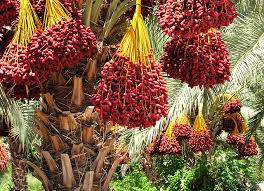
Pest Management in Date palm
Share
Introduction
Date palms are not just a symbol of desert landscapes but are also vital agricultural commodities in many parts of the world. These majestic trees, known for their sweet and nutritious fruits, face numerous challenges, particularly from pests. Effective pest management is crucial to ensure the health and productivity of date palms, which in turn supports the livelihoods of many farmers and contributes to the global food supply. This blog delves into the common pests that afflict date palms and offers practical strategies for managing and mitigating their impact, ensuring robust and fruitful date palm groves.

Major Pests in Date Palm are:
Lesser date moth
White scale
Red scale
Lesser Date Moth
Lesser date moth is an important insect pest of date palm infesting fruits. This is one of the most important pests of the date palm in UAE that may cause more than 50% loss of the crop if not properly managed. In Rajasthan, the incidence of this pest was around 16 to 20%.

Nature of damage
It starts its activity in date palm plantations, is then transmitted into storage with infested dates and can go through multiple generations within stored dates.
Controlling the lesser date moth (Batrachedra amydraula) involves integrated pest management strategies, combining cultural, biological, and chemical measures:
Cultural Control: Sanitation: Regularly remove and destroy infested dates, fallen fruits, and debris to reduce the moth’s breeding sites. Pruning: Properly prune date palm trees to improve air circulation and sunlight penetration, making the environment less favorable for the moth. Harvest Timing: Adjust the timing of harvest to minimize the period during which dates are exposed to infestation.
Biological Control: Natural Enemies: Encourage or introduce natural predators and parasitoids of the lesser date moth, such as certain species of parasitic wasps. Bacillus thuringiensis (Bt): Use Bt formulations that are effective against caterpillar pests.
Chemical Control: Insecticides: Apply insecticides with active ingredients such as spinosad, pyrethroids, or neonicotinoids, following local regulations and recommendations for safe use. Ensure targeted application to minimize impact on beneficial organisms.

Pheromone Traps: Use pheromone traps to monitor moth populations and time insecticide applications more effectively.

Mechanical Control: Bagging: Cover date clusters with protective bags to prevent moths from laying eggs on the fruits.
Monitoring and Integrated Pest Management (IPM):
Regular Monitoring: Inspect date palms regularly for signs of infestation, such as webbing and frass on fruits.
Threshold Levels: Implement control measures when moth populations reach a threshold level that can cause economic damage.
Combination of Methods: Integrate multiple control methods to reduce reliance on chemical treatments and delay the development of resistance.
Red scale
The pest breeds actively during the summer months and hibernation starts in early winter. A complete life-cycle takes approximately 55 days during summer and 158 days during winter. Three to five generations could be found annually.
It is worth mentioning that the scale appears to cause considerable damage to plants growing under favourable conditions. Areas where the climate is milder or more humid may also face severe scale attacks.

Even though this scale insect is regarded insignifi cant, and with no economic impact, the first measure is to cut away all attacked leaves and burn them in order to stop the spread of the pest. Infested palms, offshoots or even tissue culture-derived plants, which are still at the hardening phase, must be sprayed with malathion 370 – 450 g or with parathion 120 g a.m. dissolved in 450 litres of water.
Since the scale is a sucking insect, the use of ultracide or dimenthoate when the pest is mobile is also recommended. Infested offshoots could also be subjected to a temperature of 50°C for 65 hours in an insulated room. General predators, such as Pharoscymnus anchorago (Fairmaire) are considered as active predators.
White scale
White scale, caused by Parlatoria blanchardii Targ., is widely present in most date palm growing areas of the world except in USA, where it was eradicated.
It is considered a serious pest in Algeria, Kuwait, Libya, Mauritania, Morocco and Tunisia. Iraq, Oman, Saudi Arabia and Sudan consider this pest a moderate one, while Egypt, Jordan, UAE and Yemen consider it a minor pest.

Damage by white scale is very serious on young palms between two to eight years of age, but even under severe attacks, the palm and its offshoots do not die.
Nymphs and adults suck the sap from the leafl et, midribs and the dates. Under each scale insect, a discoloured area appears on the leafl et. Heavy infestation causes leafl ets to turn yellow and contributes to the premature death of the fronds.
Respiration and photosynthesis are almost stopped resulting in early death of the infested leaf. Damage on fruits is easily noticeable and the production is not marketable. The cycle of Parlatoria blanchardii Targ. The number of generations developed during one year varies from three to four depending on temperature.
The natural enemies of Parlatoria blanchardii are: Hemisarcoptes malus, Chrysoperla vulgaris, Cardiastethus nazarenus, Coccinellidae (29 species), Nitidulidae (5 species), Mycetaeidae (1 species), Aphytis mytilaspidis, Cybocephalus nigriceps, Cybocephalus rufi frones, Chilocorus bipustulatus var. iraniensis and Chilocorus sp.
In the 1980s, attempts were made to introduce the coccinellids into northern Sudan, but they were not successful either. In 1993 the coccinellids were released in Oman, but there is no information on their establishment. The introduction of coccinellids is currently being investigated in Tunisia.
Chemical control appears to be conducted occasionally in young plantations. Mineral oils are used.
Conclusion:
Effective pest management in date palms is crucial for ensuring healthy growth and high-quality yields. By implementing integrated pest management (IPM) strategies that include regular monitoring, biological control, cultural practices, and judicious use of chemical treatments, growers can minimize pest damage and promote sustainable cultivation. At Khethari Agri Tech Private Limited, we are committed to providing innovative and eco-friendly solutions to help farmers protect their crops and achieve optimal productivity. Embrace these pest management practices to safeguard your date palms and enjoy bountiful harvests.
